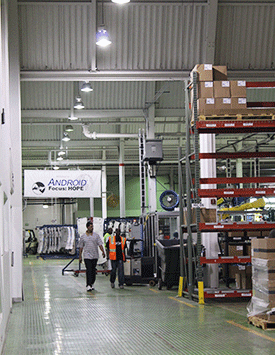Android Industries assembles “vehicle modules,” or parts of cars. Based in Auburn Hills, Mich., 33 miles from downtown Detroit, and with assembly plants all over the state, Android is in some ways a quintessential Motor City company, the kind that many people consider emblematic of a bygone era, not a place to turn to for new jobs in the struggling city.
But in fact, in 2011, Android was moving manufacturing jobs into the city of Detroit.
The manufacturer had started leasing space in the Center for Advanced Technologies building, located on Detroit’s west side, on the 35-acre campus of Focus: HOPE, a decades-old nonprofit dedicated to fighting poverty and racism. Focus: HOPE had agreed to recruit and hire Detroiters to fill manufacturing jobs at Android.
Initially, Android was planning to lease about 50,000 square feet to assemble headliners and front and rear suspension modules for the Chevrolet Volt, which would then be delivered to the General Motors Hamtramck assembly plant on the upper east side of the city. The amount increased to 70,000 square feet once Android became tenants. When the partnership first kicked off, Focus: HOPE assigned 30 employees to Android. The number of employees increased to 50 within months.
Since their partnership with Focus: HOPE launched, Android has been contracted by General Motors to assemble parts for the Chevrolet Volt, Malibu, Impala, and ELR. The company is working on the second generation Volt, which launched in August 2015, and General Motors will be launching two additional platforms in the next six months. As of August 19th, there were currently 106 employees working on one shift at Android. Android expects the number of employees from Focus: HOPE to increase to around 220 by the end of 2016, as they plan to announce a second shift in February or March to fulfill the work requested by General Motors.
“We are running four to six jobs an hour on an eight hour shift now,” says John Doroshewitz, vice president of sales for Android. “When this program got started, we had a low job-production rate, but as we picked up additional assembly work, the rate grew.”
Besides increased hiring, Android is also facing what Doroshewitz describes as a “nice problem to have”: running out of space. Android has invested $16.5 million to expand on Focus: HOPE’s campus. Doroshewitz expects that by the end of this year, the company will have about 200,000 square feet of manufacturing space. At that point, Android will no longer be able to expand in the Center for Advanced Technologies.
Getting to Partnership
The idea for this partnership was first sparked in 2006 when Android was called on to do assembly and sequence work for General Motors. “We thought maybe it would be a great idea to partner with Focus: HOPE as everyone in Detroit is pretty much familiar with their work in the community,” explains Doroshewitz.
Since its founding in 1968, Focus: HOPE has become known as a civil and human rights organization working to bridge the racial divide in southeast Michigan. Their mission is carried out through three main initiatives: a food program, an education and workforce development program, and the HOPE Village initiative, which is dedicated to revitalizing the neighborhoods within a 100-block radius of Focus: HOPE’s campus. Its workforce development and education training programs, started in 1981, have assisted nearly 12,000 men and women, most of whom are people of color, into launching careers. The curricula for the programs are developed in partnership with area employers to ensure that students develop marketable skills.
Focus: HOPE has a nearly 20 year history in manufacturing. The nonprofit even had its own manufacturing facility that supported its automotive supply business, but due to the recession and losing losing money, Focus: HOPE exited the business, shipping its last automotive part on January 31, 2006. Since that time, Focus: HOPE’s manufacturing operation has supplied the Department of Defense with vehicle components and has completed some R&D contracts around joining dissimilar materials. The operation is still open and active today, occupying space in two other facilities on campus.
Meanwhile, the nonprofit had available manufacturing space for a willing tenant to lease. Ideally, Focus: HOPE wanted a tenant that would agree to hire Detroiters, specifically local residents in need of strategically located employment.
But in 2006, a partnership between Focus: HOPE and Android Industries was not to be. “The timing wasn’t right because the details couldn’t be worked out,” explains Doroshewitz.
Two years later, Android was Android was tasked with assembling overhead and suspension modules for delivery to the General Motors Hamtramck assembly plant. Doroshewitz says Android then revisited the idea of doing a partnership with Focus: HOPE. “We knew that within two years the need for people for this project would go up.”
Providing Good Jobs
Indeed, the need for more workers did grow. With General Motors scheduled to release the 2011 Chevrolet Volt, Android was tasked with completing front and rear suspensions, corner modules and overhead, so it was imperative to bring in more workers for the assembly line. A leasing deal was settled on between the two parties, which consisted of Focus: HOPE allowing Android to lease space at a “fair rate,” and in return, Focus: HOPE would act in a role similar to a staffing agency—the organization would find people to work and place them in positions with Android. Android pays Focus: HOPE a service fee for providing employees, while Focus: HOPE pays the employees’ wages.
Many companies use a staffing agency to “lease” portions of their workforces. By taking on that role, as well as leasing its space, Focus: HOPE is not only diversifying its revenue, but attempting to simultaneously bring manufacturing jobs to Detroit neighborhoods again and connect long-term unemployed Detroiters to those jobs. “It is a service we can offer and do well,” says William Jones, Focus: HOPE’s CEO. “It’s a win for the employee, a win for Android, and a win for Focus: HOPE.”
The employees earn a wage similar to those of assembly workers at other plants that Android has throughout Michigan, including in Flint, Warren, Lansing, and Auburn Hills. Employees get benefits, including medical, dental, vision, 401(k), long-term disability, and life insurance.
Toya Jones, human resources generalist for Focus: HOPE, estimates that the gender division of applicants for the Android jobs is about 50/50. A majority of the candidates have a GED or high school diploma. Jones says candidates who have a criminal record are not turned away, as Focus: HOPE wants to give everyone a chance to start over. The ages of candidates hired range from 20s to 60s.
Jones says that she doesn’t turn away candidates that don’t have industrial experience. She is interested in candidates who have experience with manual labor, like construction, and who are fast learners and understand the concept of how to put a tool or part together.
Focus: HOPE has also found potential employees in those who have successfully completed its Production Workers training program. Under Focus: HOPE’s workforce development and education programs, people can earn a certificate in advanced manufacturing from Focus: HOPE’s Machinist Training Institute, which offers hands-on machinist training.
Production Workers training, which started nearly three years ago, is held for two to three weeks, Monday through Friday, from 8:30 a.m. to 4:30 p.m. Students receive OSHA (Occupational Safety and Health Administration), diversity, and conflict management training. They learn skills in time management, financial literacy, and personal appearance. They are also assessed on their attitude and attendance. Students receive an introduction to the industry that they will be working in, such as machining or production. They are required to do research on the industry and/or company that they are interested in working in. At the end of the program, students are required to make a PowerPoint presentation on their selected industry. Classes that are tailored for Android may also include hi-lo driver training, security training, and some on-site training.
The content for the program is based on feedback from employers about frequent challenges they face with new employees. Classes are held based on employer demand. Classes are held for Android when they anticipate a large opening for hires. Focus: HOPE expects to hold Production Workers training in the fall.
There were some challenges. “When we first moved in, Focus: HOPE’s management wasn’t used to staffing for a fast-paced assembly plant,” explains Doroshewitz. Before, the agency was accustomed to staffing for batch building projects, which is when there is an order, for example, of 100 parts on a machine, but if only 80 are supplied by the end of the day, it is not a problem because the rest could be made up the next day.
“If we don’t produce these modules on a quick basis and have the lines properly staffed, GM can’t produce a vehicle and would have to shut down a plant,” says Doroshewitz. “We needed people ready to work to cover for absenteeism, turnover, and overtime. Focus: HOPE developed a pool of people that I can call and they will show up.”
To have the on-call employees ready, Focus: HOPE places three people to work in its own facilities department who are considered “on the bench” as production workers for Android. They generally try to keep two general assembly workers and one hi-lo driver. These employees have already been trained and oriented. This allows Focus: HOPE to fulfill Android’s staffing needs reliably without subjecting the workers involved to as much inconsistent employment.
“The partnership has turned out to be better than we thought,” Doroshewitz says. “It’s been a great relationship all the way.”
A Manufacturing Comeback?
Overall, manufacturing employment in Michigan is on the rise. According to the 2015 Michigan Manufacturers Directory, the state is seeing an increase in manufacturing jobs for the fourth year in a row, adding 14,809 jobs between February 2014 and February 2015.
Manufacturing continues to be important for Detroit’s economy, with industrial manufacturing and health related manufacturing identified as economic growth pillars for the city.
The push for new manufacturing jobs is coupled with a need for job training programs, as there is a strong demand for middle-skill workers. A JP Morgan Chase & Co. report, “New Skills At Work: Driving Opportunity in Detroit,” states that “helping to prepare low-income and low-skilled individuals—particularly minorities and city residents—for middle-skill occupations must be a regional workforce development priority.”
“Manufacturing is transforming and moving from a division of labor where jobs can be easily located to other parts of the country and the world to [an industry] with more innovative skills and processes that really rely on a skilled workforce,” says Dan Kinkead, director of projects for the Detroit Future City (DFC) Implementation Office. “And that puts Detroit at an advantage, particularly with partners like Focus: HOPE who supply that workforce.”
“I love the term advanced manufacturing because it’s such a big bucket,” says Kenneth Chapa, executive vice president of business development for the Detroit Economic Growth Corporation. “It’s not the same manufacturing as your grandparents did. We’re talking high tech and high value manufacturing where in some cases you can start off at $45,000 in an entry level position.”
Automotive still remains the top industry for manufacturing jobs in Detroit, but Chapa says there is a lot of opportunities for many other types of manufacturing, whether it be aerospace and defense, medical devices, or advanced composites.
“We have an amazing infrastructure in the city; it’s built to support 3 million people,” says Chapa. “There is a large accessible labor pool here. If for some reason they don’t have the skills in place to take advantage of these opportunities right away, they have access to organizations like Focus: HOPE, which is a real asset to us as they can help Detroiters get the training they need to compete for jobs.
“Very rarely do you see a nonprofit do the amount of training that Focus: HOPE does at the level they do,” he adds.
There are a number of examples around the city of suppliers and entrepreneurs pushing for innovative solutions to create more jobs and initiate economic growth. Take for instance the company Shinola, which designs, builds, and sells watches, bicycles, leather goods, journals, and other high-end products. Tom Kartsotis, founder of Fossil, had an idea in early 2011 to build a small watch factory that would sell high-quality watches. Today, Shinola has eight retail outlets and employs around 375 people, most of them in Detroit, according to The New York Times.
In May, American Axle & Manufacturing announced that it aims to create 1,000 new jobs in Detroit over the next five years near its headquarters in the city. CEO David Dauch told the Detroit Free Press that among the 1,000 new jobs he envisions are about 100 engineers and technicians, which are part of a plan to invest $20 million in an advanced technology department center. He also said that AAM is trying to attract other manufacturers to their campus, and there is a plan to put a training center on campus.
At Lift (American Lightweight Materials Manufacturing Innovation Institute), national and local partners are using vacant industrial buildings and skilled workers to establish a new manufacturing center for lightweight materials. In January, Lift opened a 100,000-square-foot innovation acceleration center. The goal for the facility is to accelerate the transfer of new manufacturing technology from the research lab to the production floor using lightweight materials, such as aluminum, magnesium, titanium, and advanced high-strength steel alloys. The center will also offer training to workers.
Last year, Detroit Manufacturing Systems, an automotive supplier, hired 729 people at its plant in the city. More than two thirds of those workers live in Detroit.
Although he could not offer specifics at this time, Chapa says that within the next 12 months, DEGC is very optimistic that there will be some high-profile employers opening locations in Detroit that will create a workforce demand the city hasn’t seen in a while.
“People want to be here,” he says. “People want to live and work in Detroit.”
A Model for the City
Focus: HOPE CEO William Jones says that while there are several nonprofits in the city that are involved in supplying staffing solutions, he describes the partnership between Focus: HOPE and Android Industries as “unique to the city of Detroit.”
“We had a unique facility and an array of assets,” he says. “We saw an opportunity to lease space and provide a workforce to manufacturing.”
Focus: HOPE and Android’s initial contract was for a five-year term, which has now been extended through 2021, according to Doroshewitz.
Focus: HOPE and Android both say that employees have done very well and some have moved on to other jobs, including within Android.
“This partnership is complementary to our workforce development and neighborhood efforts, and what we are trying to do in the city of Detroit is inspire population and job growth,” says Jones. “We don’t think of this as a one generation solution, but a multigenerational solution.”
This article was made possible by a Surdna Foundation grant supporting equitable economic development reporting.





Comments